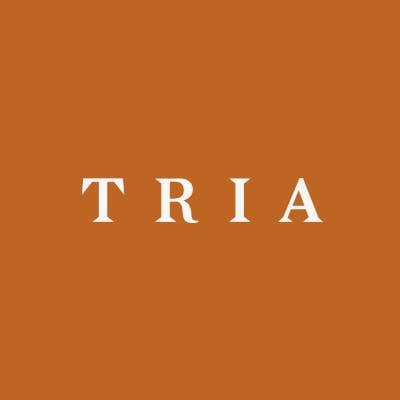Tria Wine School

Tria Wine School—also known over the years as the Tria Fermentation School and, most recently, Tria Events—has been part of Philadelphia’s wine scene since 2006. Born out of the Tria Café group, its mission has always been different from formal programs like WSET or the Wine School of Philadelphia. Tria built its reputation on approachable, one-off tastings rather than structured coursework or certification.
Strengths
The program has always excelled in one area: making wine accessible to the general public. Early classes at the Walnut Street location (2006–2015) were inexpensive, lively, and often sold out. Guest winemakers, sommeliers, and cheesemongers brought credibility and variety to the event. During the COVID shutdown, Tria pivoted quickly to Zoom tastings with pickup kits, drawing thousands of attendees and keeping the business afloat. Its ability to adapt to changing conditions and to package wine education in a casual, social format remains its strongest asset.
The new Tria Events space, opened in 2025 at 1726 Sansom Street, reflects this focus. The venue seats about 30, prices classes at $50–$100, and doubles as a private events space. The current leadership team, led by wine director Lauren Harris, emphasizes a relaxed and consumer-friendly approach to instruction.
Weaknesses
For professionals or serious students, Tria’s offering is limited. There is no pathway to certification, no progressive curriculum, and little academic rigor. It competes more with a night out than with a wine school.
Stability is another issue. The original Walnut Street school closed in 2015 without notice. The brand has undergone multiple pivots—transitioning from Zoom classes to small mezzanine events, and now to Tria Events—raising questions about its long-term commitment to education.
Customer complaints have also followed. Tria enforces a strict no-refund policy, resulting in negative reviews from students who were unable to attend. During the pandemic, delayed credit redemptions drew enough frustration that one customer reported filing complaints with the BBB and the Attorney General.
Most concerning for industry observers are allegations about workplace culture. A 2022 Eater Philadelphia investigation detailed claims from more than 20 former employees of verbal abuse, sexualized comments, and discriminatory practices by founder Jon Myerow. No lawsuits followed, but the reporting cast a shadow over the brand’s public image and raised management questions.
Bottom Line
Tria Wine School succeeds as an entry point for casual consumers who want an entertaining evening of wine and cheese. It does not function as a professional wine school, nor does it offer structured education for career-track students. The history of abrupt closures, refund complaints, and negative press around ownership makes its future as an education provider uncertain.
For wine professionals, Tria’s classes may offer networking or a lighthearted night out, but they are no substitute for rigorous study. For consumers, the experience can be enjoyable—if you accept the no-refund policy and overlook the company’s shortcomings.
Comparison: Tria Wine School vs. Wine School of Philadelphia vs. PhillyWine
| Feature | Tria Events | Wine School of Philadelphia | PhillyWine |
|---|---|---|---|
| Founded | 2006, by Tria Café owners | 2001, by winemaker Keith Wallace. | 1990s, under Neal Ewing; rebranded 2022 under Noelle Allen |
| Core Focus | Recreational tastings, wine & cheese pairings, consumer-friendly events | Professional wine education, sommelier certification, consumer classes | British-based WSET certification programs (Levels 1–3, Diploma) |
| Format | Standalone classes ($50–$100), private events ($1,500–$3,000 minimums), ~32 seats | Multi-week certification courses (L1–L4), plus single-night classes; extensive tasting lists | Structured WSET coursework, PowerPoint-heavy lectures, limited tasting depth |
| Certification | None | National Wine School credentials (L1–L4, Sommelier Pin, Advanced, Master) | WSET certifications (internationally recognized, but quality of local delivery widely criticized) |
| Target Audience | General public, casual wine enthusiasts, corporate groups | Wine students, professionals, serious consumers | Students seeking WSET credentials, despite poor local reputation |
| Teaching Style | Informal, social, approachable | Narrative-driven, structured, includes tasting exams | Described by students as “dry,” “uninspiring,” and reciting from reading materials |
| Reputation | Fun, but inconsistent; history of closures and refund complaints; workplace controversy tied to owner | Serious, nationally recognized; top ranked wine school in USA. | Ranked among the lowest WSET providers in the U.S.; past reports of unprofessional conduct |
| Negatives | No formal training; multiple closures (2015, relaunch 2020/2025); strict refund policy; 2022 employee abuse allegations | Demanding coursework; can be intimidating for casual drinkers | Poor teaching quality, history of slanderous remarks by former director, inconsistent delivery |
| Current Status (2025) | “Tria Events” space at 1726 Sansom Street, Philadelphia | Operating full curriculum in Center City Philadelphia | Now run by Noelle Allen as PhillyWine LLC; still considered unstable, with hopes for improvement |
